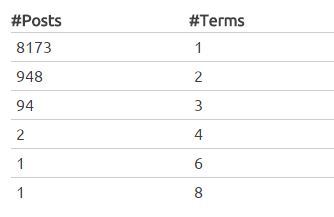I have over 4000 posts. I am trying to query all the posts and get the count of tags each post has and sum up posts count based on number of tags the post has in dashboard. The posts count shows up properly when post_per_page is less than 2000 but beyond 2000 , the query timesout . It just shows '0' for all.
Code
$args = array(
'posts_per_page' => 4000,
'post_status' => 'publish',
);
$zerotags = 0;
$onetag = 0;
$twotags = 0;
$morethantwo = 0;
$sixtags_plus = 0;
$query = new WP_Query( $args );
while ( $query->have_posts() ) : $query->the_post();
$posttags = get_the_tags();
$tag_count = 0;
foreach($posttags as $tag) {
$tag_count++;
}
if ($tag_count == 0) {
$zerotags++;
}
if ($tag_count == 1) {
$onetag++;
}
if ($tag_count == 2) {
$twotags++;
}
if ($tag_count > 2 && $tag_count < 6) {
$morethantwo++;
}
if ($tag_count >= 6) {
$sixtags_plus++;
}
endwhile;
echo 'Zero Tags : '.$zerotags.'posts';
echo 'One Tag : '.$onetag.'posts';
echo 'Two Tags : '.$twotags.'posts';
echo 'More than 2 and less than 6 : '.$morethantwo.'posts';
echo 'More than 6 tags : '.$sixtags_plus.'posts';
Is there a better approach to query this so that the timeout doesn't occur?

